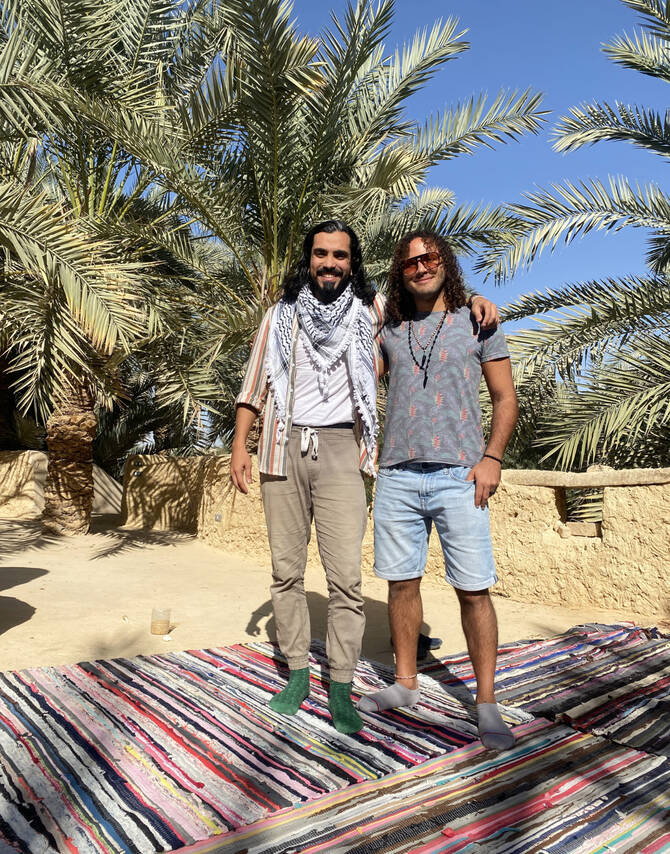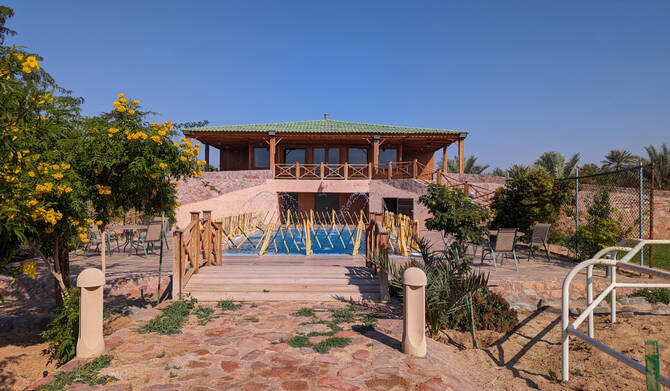JEDDAH: In the sacred embrace of Madinah, one of Islam’s holiest sites, a new culture-oriented wellness experience is offering a journey that integrates spirituality, culture, and heritage.
The inspiration behind Madinah Retreats stems from founder Moatassem Al-Bitar’s experience in the wellness and spiritual tourism industry in Saudi Arabia and beyond.
Recognizing key gaps in traditional retreat models and leveraging Saudi Arabia’s tourism vision, he envisioned a paradigm shift that blends modern wellness practices, cultural expeditions, and spiritual experiences into a single journey.

Our first retreat was earlier in February 24-28, 2025. (Supplied)
With a background as a corporate culture change and people engagement manager, Al-Bitar has curated over 50 retreats across Saudi Arabia, Egypt, and the US, serving more than 400 participants.
His academic training spans diverse fields, including organizational behavior, Islamic spirituality, and intercultural studies.
Officially launched in 2024 after five years in the making, the initiative held its second retreat, under the theme “The Arrival,” earlier this year in Madinah.
FASTFACTS
• Madinah Retreats stems from founder Moatassem Al-Bitar’s experience in the wellness and spiritual tourism industry in Saudi Arabia and beyond.
• It blends modern wellness practices, cultural expeditions, and spiritual experiences into a single journey.
Al-Bitar told Arab News: “Every retreat we design starts with clear intentions and objectives, supplemented by a story and a theme that aligns with a particular destination.”
The retreats feature a collective of facilitators who work together toward a unified intention, ensuring a balanced and immersive experience.
“One of our main goals is to promote different destinations in Saudi Arabia that are perfectly ideal for wellness-centric experiences, in addition to its unmatched culturally enriching character,” Al-Bitar said.
“We seek to partner with pertinent governmental initiatives and entities that fulfill the Kingdom’s Vision 2030 for wellness tourism and exceptional experiences.”
Al-Bitar explained that each retreat is meticulously structured around three core pillars: spirituality (meditative practices and inner reflection); culture (heritage site visits, traditional storytelling, and local experiences); and wellness (movement–based practices, mindfulness exercises, and healing foods).
By integrating these elements into daily programs, Madinah Retreats offers a journey tailored to the needs of participants and is a “philosophy of being rooted, real, and rich.”
The retreats target individuals and groups seeking genuine transformation in their well-being, spiritual connection, and cultural enrichment. They provide a safe and accepting space where participants are respected on their unique paths to healing.
Madinah, which is the spiritual capital of Islam, is popularly known as the Illuminated City. It offers an atmosphere of peace and rejuvenation, and its diverse topography and climate make it ideal for nature-based healing.
“Madinah is widely recognized as a destination where the heart feels at peace, the body feels rejuvenated, the mind feels clarity and the soul feels enriched,” said Al-Bitar. “The city’s rapid development and recognition as a top global tourism destination further enhance its appeal.”
The Madinah Retreats experience is usually hosted in a traditional farm resort surrounded by nature. Participants visit cultural and historic sites, explore the city’s vibrant social scene, and experience local cuisine, contemporary art, and community traditions.
“During the retreat we offer meditation, breathwork, self-reflection, yoga, tai chi, and other somatic therapies, creative expression as a healing tool, as well as locally sourced, nourishing meals,” Al-Bitar added.
The somatic practices guided by expert facilitators enhance body awareness and overall well-being.
Al-Bitar said: “Connecting with nature and animals has proven therapeutic benefits. Madinah Retreats incorporates nature-based and equine therapy to help participants reconnect with their original disposition, providing an irreplaceable form of healing.”
Cultural storytelling is also an essential component, allowing participants to explore the hidden wisdom of each landmark and understand local traditions and historic practices.
No prior experience in meditation or wellness practices is required, making the retreats accessible to all.
Honoring his Egyptian roots, Al-Bitar is expanding the retreats to Siwa, Egypt.
Siwa Oasis, nestled within a breathtaking desert landscape, is characterized by vast dunes, striking limestone outcrops, and distinctive geomorphological features that enhance its appeal as a tourist destination.
“The expansion to Siwa, Egypt, was inspired by the oasis’ 160-year-old tradition of reconciliation — Eid El-Solh, a celebration of harmony,” Al-Bitar said.
“Siwa’s natural healing elements, such as salt lakes, hot springs, and lush landscapes, mirror many of Madinah’s restorative qualities.”
Al-Bitar said that Madinah Retreats will also explore the Kingdom’s hidden gems by hosting retreats in Abha, Aseer, Al-Ahsa, and other locations rich in healing nature and cultural heritage.
Retreat prices range from SR5,000 ($1,333) to SR10,000, depending on the location, program, facilitators, transportation, and accommodation.
Madinah Retreats follows a collaborative model, partnering with local service providers, facilitators, and experts to provide an experience that remains true to the cultural essence of each destination.
Al-Bitar said: “Our content caters to people from different backgrounds, both English and Arabic speakers. Our agenda is characterized by being spacious and offers ample time for self-guided practices. Our way of delivery is strictly non-intrusive.”
Participants leave Madinah Retreats feeling “transformed, enriched, and connected to their most authentic selves.”
Al-Bitar said that the experience embodied the profound wisdom: “You presume you are a small entity, but within you is enfolded the entire universe.”
Madinah Retreats also provides a customized retreat model that caters to corporations and teams, as well as add-on visits such as expeditions in AlUla.































